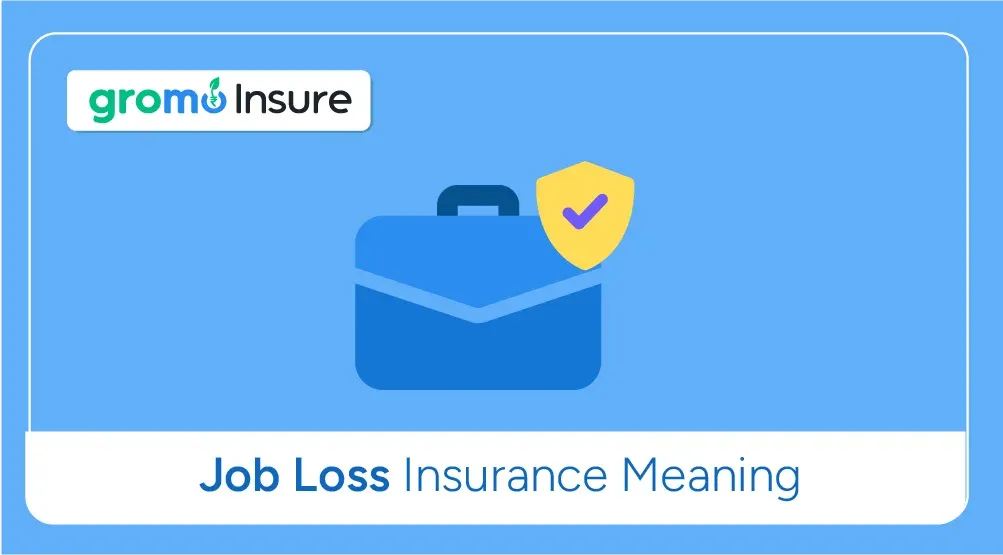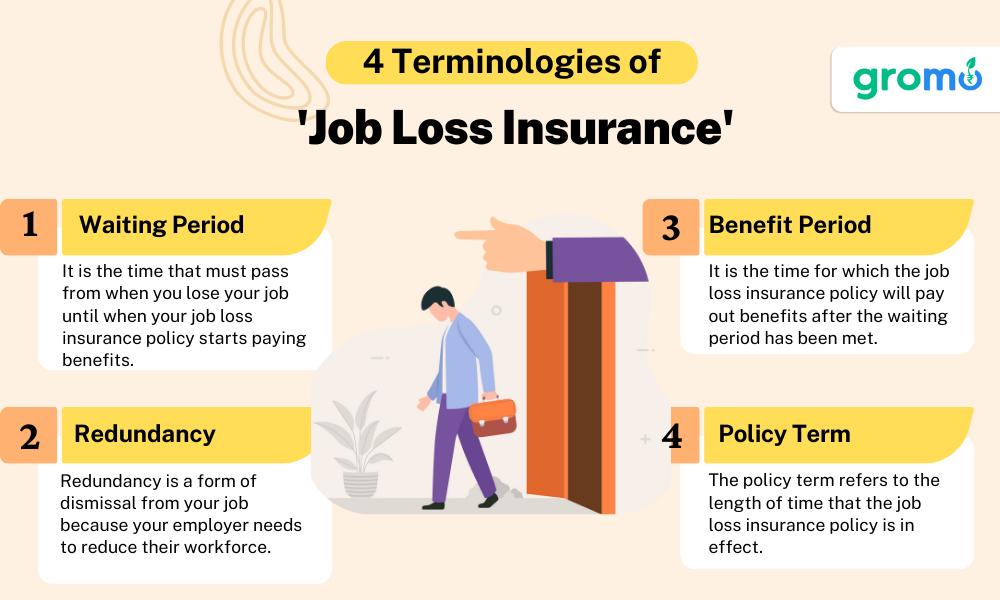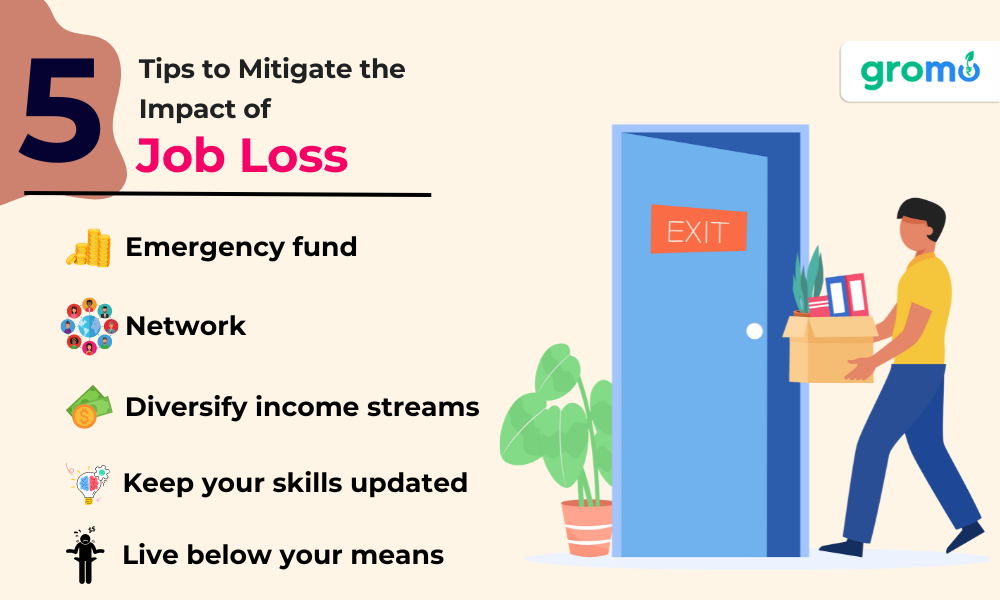Job Loss Insurance Terms And Definitions: Exhaustive List
Job Loss Insurance: A Deep Dive Job loss insurance, also known as redundancy insurance is a policy that provides financial assistance

Job Loss Insurance: A Deep Dive
Job loss insurance, also known as redundancy insurance or unemployment insurance, is a policy that provides financial assistance if you lose your job due to circumstances beyond your control, such as redundancy or business closure. But, like any other type of insurance, understanding job loss insurance requires clarity on some essential terms. Let's look at them in detail:
-
Involuntary Unemployment
Involuntary unemployment is a situation where a person is laid off or dismissed from their job due to no fault of their own. This could be a result of company-wide layoffs, a company shutting down, or job loss due to disability or illness. -
Waiting Period
The waiting period, also known as the 'exclusion period', refers to the time that must pass from when you lose your job until when your job loss insurance policy starts paying benefits. It is a crucial term to understand as the coverage doesn't start immediately after job loss. -
Benefit Period
The benefit period is the length of time for which the job loss insurance policy will pay out benefits after the waiting period has been met. Policies may offer varying lengths for benefit periods, and understanding this term is essential to anticipate the support you can expect from the policy. -
Redundancy
Redundancy is a form of dismissal from your job because your employer needs to reduce their workforce. It's crucial to understand this term as job loss insurance typically covers involuntary job loss, which includes redundancy. -
Severance Pay
Severance pay is the compensation that an employee receives when they are let go by a company. It often depends on the length of employment and is not usually covered by job loss insurance. -
Underemployment
-
Underemployment is a situation where a person is working less than full-time or working in a position below their skill level due to a lack of available jobs. Some job loss insurance policies may provide coverage if you're underemployed after a layoff.
-
Policy Term
The policy term refers to the length of time that the job loss insurance policy is in effect. This can typically range from months to years, and it's important to understand this term to know how long you're covered.
Understanding these key terms related to job loss insurance can help you assess whether this type of policy is right for you, what to expect from a policy, and how to effectively compare different job loss insurance policies to find the best fit.

Misconceptions About Job Loss Insurance
Many people often mistake job loss insurance for income protection insurance or believe it to be a part of their standard home insurance policy. However, job loss insurance is a distinct form of insurance designed specifically to provide coverage in the event of job loss.
Moreover, while job loss insurance can offer financial relief during a period of unemployment, it's important to note that this policy usually covers only a percentage of your income and not the full amount. As such, it's meant to assist with necessary expenses during unemployment rather than completely replace your income.
The Need for Job Loss Insurance
In times of economic uncertainty or personal health issues, having a job loss insurance policy can provide a valuable safety net. It ensures you can continue to meet your financial commitments and maintain your standard of living until you find another job. Additionally, it offers peace of mind, knowing that you're financially prepared for unexpected job loss.
Understanding job loss insurance and its related terms is the first step towards making an informed decision about whether this type of coverage is right for you. Consider your personal circumstances, financial commitments, and the stability of your employment when considering
Unemployment Insurance vs. Job Loss Insurance
Unemployment insurance and job loss insurance often get mixed up, but they are distinct. Unemployment insurance is a government program that provides temporary financial assistance to workers who become unemployed through no fault of their own and who meet other eligibility requirements. This coverage is usually provided on a state-by-state basis in countries like the United States.
On the other hand, job loss insurance is a private policy that you purchase on your own. It provides a lump sum or monthly payments to cover your bills and expenses if you lose your job.
*To sell this product, and many other financial products. DOWNLOAD GROMO. Where you can sell and earn a substantial income sitting at home
ADDITIONAL RELATED TERMS
Employment History: A stable employment history could lead to lower premiums, while a history of frequent job changes might increase the premiums.
Industry and Occupation: Some industries and occupations have higher redundancy rates and thus may attract higher premiums.
Waiting Period: Choosing a longer waiting period before benefits start can help reduce premiums.
Choosing the Right Job Loss Insurance Policy
Here are few steps to guide you in choosing the right job loss insurance policy:
Assess Your Needs: Consider how much income you would need to cover your essential expenses if you lost your job.
Compare Policies: Look at different policies, compare the premiums, benefit periods, waiting periods, and the percentage of your income that would be covered.
Understand the Terms and Conditions: Be sure you understand what is and isn't covered by the policy. For example, some policies won't cover job loss due to resignation or termination for misconduct.
Seek Professional Advice: If you're unsure, consider seeking advice from a financial adviser who can guide you based on your personal circumstances.
Job Loss Insurance: A Safety Net
Job loss insurance can provide a safety net during a difficult time. However, it's important to thoroughly understand the related terms and conditions of a policy before purchasing it. An unexpected job loss can be financially challenging, but with job loss insurance, you can have peace of mind knowing you have a plan in place to help manage your financial responsibilities.
Remember, insurance products should complement a holistic financial plan that includes an emergency fund, budgeting, saving, and investing. Job loss insurance is not a replacement for sound financial management but can be an effective tool in your broader financial strategy.
CHECK OUT!!
- Savings Account Meaning: Important Related Terms
- Demat Account Meaning: Meaning, Significance, and Other Key Details
- Buy Now Pay Later App: Popular Apps In India
- Instant Loan Meaning: A Comprehensive Guide to Related Terms
Exclusions in Job Loss Insurance
Just as critical as understanding the benefits of job loss insurance, it's equally important to recognize what it doesn't cover. Common exclusions in job loss insurance policies might include:
Voluntary unemployment: If you willingly leave your job, for instance, by resignation, most job loss insurance policies won't cover you.
Dismissal due to misconduct: If you're dismissed from your job due to fraudulent activities or misconduct, you might not receive coverage.
Pre-existing conditions: Job loss due to a pre-existing medical condition is usually not covered.
Retirement: If you retire, your policy won't pay out.
Fixed-term contracts: Employees on fixed-term contracts may not be covered when their contracts naturally end.
Knowing these exclusions can help you understand the level of protection your policy provides and can guide your decision-making process while choosing a policy.

The Role of Financial Advisors
Financial advisors can provide valuable guidance while selecting a job loss insurance policy. They can help you:
Understand the details of various policies: Financial advisors are well-versed with the nuances of different insurance policies. They can explain the terms and conditions in plain language, helping you understand the implications.
Assess your financial needs: Advisors can take a comprehensive view of your financial situation and help determine the amount of coverage you might need.
Choose a suitable policy: With their expertise, financial advisors can compare different policies and help you select the one that best fits your needs and circumstances.
Hence, consulting a financial advisor could be beneficial if you're considering buying job loss insurance.
Job loss insurance can serve as a financial buoy, offering you a financial backup when you need it most. However, it's not a one-size-fits-all solution and should be tailored to your unique financial situation and risk tolerance. It's a complex product with many variables, and understanding these factors can help you make an informed decision. Always remember to read the fine print, ask questions, and seek professional advice if you're unsure.
By understanding the meaning and related terms of job loss insurance, you can better prepare for the unforeseen and protect your financial well-being. It can be a prudent addition to your financial plan, providing an extra layer of security in today's uncertain job market.
Tips to Mitigate the Impact of Job Loss
While job loss insurance provides a financial safety net in case of unexpected unemployment, it's also essential to be proactive in mitigating the impact of potential job loss. Here are some strategies you might want to consider:
Emergency fund: Financial advisors usually recommend having three to six months' worth of living expenses saved in an emergency fund. This money can be used to cover necessary expenses during periods of unemployment.
Diversify income streams: Having multiple income streams can help cushion the impact of losing a primary job. This can include part-time work, freelancing, investing, or even a side business.
Keep your skills updated: In today's rapidly evolving job market, continually updating and refining your skills can increase your employability and open new job opportunities.
Network: Regular networking can help you stay informed about job opportunities in your industry and make valuable connections that could be beneficial in the event of job loss.
Live below your means: If possible, aim to spend less than you earn. This practice can help you save more and reduce the financial strain during periods of unemployment.
Understanding job loss insurance and its related terms can empower you to make informed decisions about your financial security. It's a complex topic that encompasses various aspects, including its meaning, benefits, limitations, policy terms, and mitigation strategies.
Job loss insurance can be a valuable part of your financial plan, particularly in uncertain economic times. However, it's essential to carefully consider your unique circumstances, understand the details of the policy, and seek professional advice if needed.
By equipping yourself with this knowledge, you can better navigate the financial implications of unexpected job loss and safeguard your financial future. Remember, preparation is key to handling life's uncertainties, and understanding job loss insurance is a significant step in that direction.
*Looking for an app for earning online? GroMo is your answer! Now earn with each sale by selling various kinds of financial products
Exploring Alternatives to Job Loss Insurance
While job loss insurance is a valid consideration, it's also worth looking into alternatives that could provide financial security in the event of unemployment.
Self-Insurance: This essentially involves creating your own job loss fund instead of paying premiums to an insurance company. This strategy can be particularly effective if you have a stable job and can afford to regularly save money.
Severance Packages: Many employers provide severance packages that offer a lump-sum payment or continue to pay a portion of your salary for a specified period after job loss. It's beneficial to understand the details of your potential severance package when considering job loss insurance.
Unemployment Benefits: Government-provided unemployment benefits can offer some financial support during periods of joblessness. However, eligibility requirements and benefit amounts vary, so it's essential to understand the specifics in your area.
Income Protection Insurance: This type of insurance provides a regular income if you're unable to work due to illness or injury. While it doesn't cover job loss due to redundancy or termination, it can be a valuable component of your overall financial security plan.
Redundancy Insurance: Similar to job loss insurance, redundancy insurance provides financial support if you're made redundant. However, it usually does not cover job loss due to misconduct, voluntary redundancy, or resignation.
Before deciding on job loss insurance or any other financial safety net, thorough research, financial planning, and professional advice are highly recommended. With the right plan in place, you can face the future with more confidence, secure in the knowledge that you're prepared for whatever comes your way.
Understanding the nuances of job loss insurance might seem daunting at first, but the effort invested in comprehending these intricacies can indeed pay off in the long run. After all, when it comes to financial security and peace of mind, there's truly no shortcut to being well-informed.
CHECK OUT!!
- Job Loss Insurance Meaning: Financial Planning Tips
- Difference Between Insurance and Investment: Explained
- How To Get Instant Loans: Step By Step Guide
- Health Insurance Meaning: An Essential Financial Safety Net
KEY TAKEAWAYS
-
Understanding Job Loss Insurance: Job loss insurance, also known as unemployment insurance, is a policy that provides financial assistance to the policyholder if they involuntarily lose their job. It is designed to cover a portion of the income lost during this period.
-
Job Loss Insurance Elements: Key terms related to job loss insurance include waiting period, benefit period, exclusions, and premium. Understanding these elements is crucial to choosing a policy that fits your needs.
-
Insurance Scope and Exclusions: Job loss insurance policies generally cover involuntary unemployment caused by layoffs or company downsizing, but not resignations or terminations due to misconduct. Each policy will have a specific set of covered circumstances, which should be thoroughly examined.
-
Alternatives to Job Loss Insurance: Besides job loss insurance, there are other ways to protect yourself financially in the event of a job loss, including self-insurance, severance packages, government-provided unemployment benefits, income protection insurance, and redundancy insurance.
-
Importance of Thorough Research and Planning: Before deciding on job loss insurance or any other financial safety net, it is recommended to conduct extensive research, consider professional advice, and plan according to individual circumstances and financial capacity.









